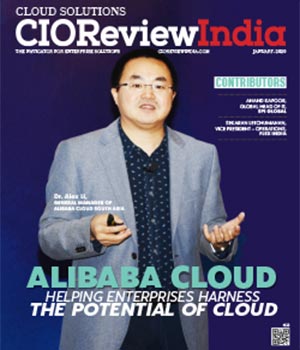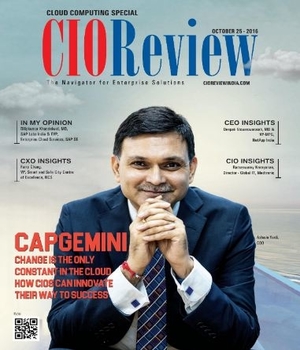
Significance of adopting cloud computing in digital commerce operations
Janifha Evangeline | Saturday, 08 July 2023, 14:47 IST

In an interaction with CIOTechOutlook, Yashdeep Vaishnav, Country Head, VTEX shares his views on the major challenges merchants face when it comes to adopting cloud computing in their digital commerce operations, the types of skills and expertise merchants need to successfully adopt and manage cloud computing solutions and more.
What are the major challenges that merchants face when it comes to adopting cloud computing in their digital commerce operations?
As merchants continue to adapt to market disruption and meet customer demand, many companies are heavily investing in cloud to improve their operational models and deliver digital services. There are companies that are not able to take full advantage of cloud due to operational challenges around costs, security, and compliance. Some of the common challenges that merchants are facing today include:
Security Concerns: It is a critical concern when adopting cloud computing. Merchants need to ensure that their data is protected from unauthorized access, data breaches, and other security risks. They may need to assess the security measures and certifications provided by cloud service providers and implement additional security measures to safeguard their data.
Compliance and Legal Considerations: Depending on the industry and location, merchants may have to comply with various regulations and legal requirements, such as data protection laws (e.g., GDPR, CCPA), industry-specific regulations (e.g., PCI-DSS for payment card data), and local data residency requirements. Ensuring compliance with these regulations in a cloud computing environment can be complex and require careful planning and implementation.
Integration and Interoperability: Merchants often have existing technology systems, such as legacy on-premises solutions or third-party applications, that need to integrate with cloud-based solutions. Achieving seamless integration and interoperability between different systems can be challenging, especially when dealing with diverse data formats, APIs, and protocols. It may require custom development or the use of middleware and integration tools.
Cost Management: While cloud computing offers potential cost savings compared to on-premises infrastructure, it also introduces new cost management challenges. Merchants need to understand the pricing models of cloud service providers, optimize resource allocation, and monitor usage to avoid unexpected costs. They should also consider factors like storage costs, network bandwidth, and data transfer fees to accurately forecast and manage their cloud expenses.
Staff Skills and Training: Cloud computing technologies and platforms require specific skills and expertise to effectively manage and operate. Merchants may face challenges in finding and retaining skilled professionals with the necessary knowledge of cloud architecture, security, DevOps practices, and other relevant areas. Providing adequate training and upskilling opportunities for existing staff or hiring qualified cloud professionals can help address this challenge.
What types of skills and expertise do merchants need to successfully adopt and manage cloud computing solutions in their digital commerce operations?
The rise of cloud computing is increasingly changing the skills required in the modern technology environment. Merchants are looking to capitalize on cloud computing over the next few years. They need a range of skills and expertise to successfully adopt cloud.
Here are some key areas where skills and expertise are crucial:
Cloud Security: Security is an important aspect in cloud. Merchants need experts who are well-versed in cloud security practices, data encryption, access controls, identity and access management, vulnerability assessment, and security monitoring. To keep the organization assets protected, merchants also need to learn how to use various cloud security tools offered by vendors like AWS, Google Cloud Provider and Microsoft Azure.
Database management: Merchants need skills in managing and analyzing large volumes of data in the cloud. It is important to have knowledge of various database services including data lake, relational database, NoSQL, graph database and data warehouse offerings.
Integration and Application programming interfaces (APIs): Integrating cloud-based solutions with existing systems and third-party applications is a common requirement. Merchants should have professionals who understand integration techniques, API development, and protocols (e.g., REST, SOAP). Merchants must have experts who can code various APIs and the links used to integrate workloads into the cloud.
DevOps: DevOps practices facilitate efficient development, deployment, and management of cloud applications. Merchants need professionals who understand DevOps methodologies, continuous integration and continuous deployment (CI/CD) pipelines, infrastructure automation, and containerization (e.g., Docker, Kubernetes) to streamline processes and enhance agility.
Cloud Service Providers (CSP): Merchants need to have a thorough understanding of the CSP marketplace such as Amazon Web Services, Microsoft Azure, Google Cloud Platform and their offerings. It is important to understand the specific features, pricing models, service level agreements (SLAs), and resource management capabilities of each provider to choose the right service provider based on the requirements.
How can merchants ensure that they have the necessary infrastructure and resources to support the adoption of cloud computing in their digital commerce operations?
Cloud computing has been a revolutionary technology trend for businesses of all sizes across sectors. It has become a core component of modern infrastructure and companies are investing in various cloud service providers. Merchants should carefully evaluate different cloud service providers based on their specific requirements, such as scalability, security, compliance, pricing, and available services. Consider factors like the provider's reputation, reliability, support options, and experience in the digital commerce domain. Merchants should analyze their data management needs and ensure they have appropriate solutions in place to handle data in the cloud. This includes evaluating data storage options (e.g., object storage, databases), data backup and recovery mechanisms, data migration strategies, and data governance practices. Merchants should evaluate their existing infrastructure, including hardware, networking, and software systems. This assessment helps identify any gaps or limitations that may hinder cloud adoption. It provides insights into areas where upgrades or modifications are required to support cloud-based solutions effectively. Merchants should develop a clear strategy for cloud adoption aligned with their business goals and this strategy should outline the specific objectives, expected benefits, and roadmap for migrating to the cloud. Robust and reliable network connectivity is crucial for cloud computing. Merchants should evaluate their network infrastructure and ensure sufficient bandwidth, low latency, and high availability to connect with cloud service providers.
Merchants should plan and execute a well-defined migration strategy when transitioning their digital commerce operations to the cloud. This involves identifying suitable applications, prioritizing workloads for migration, selecting appropriate migration methods (e.g., lift-and-shift, re-platforming), and establishing a phased deployment approach. Merchants need to understand the skills and expertise of their IT team to support cloud adoption. Providing training and upskilling opportunities for existing staff can help ensure they have the knowledge and expertise required to manage cloud infrastructure effectively.
How can merchants ensure that their cloud computing solutions are scalable and can handle increased traffic and transactions during peak periods?
Cloud allows merchant players to effectively and seamlessly manage increased traffic and transactions during peak and trough periods by enabling them to spin up and decrease servers virtually on cloud as per the demand. This can only happen by making the architecture horizontally scalable and this ensures that the system scales up or down dynamically without manual intervention. Auto-scaling allows the infrastructure to automatically adjust resources based on predefined rules or metrics. Load balancing distributes incoming traffic across multiple servers or instances to prevent overloading a single resource. Merchants should deploy load-balancing techniques such as round-robin, least connections, or intelligent load-balancing algorithms. Caching mechanisms can significantly improve performance and reduce the load on backend systems. Merchants can utilize in-memory caching solutions to store frequently accessed data, static content, or API responses closer to the end-users.
Database performance can be a critical factor in handling increased traffic during peak periods. It is important to optimize the database queries, indexes, and caching strategies to ensure efficient retrieval and storage of data. The cloud service provider should ensure that merchants’ architecture and configurations are optimized for scalability. They should offer guidance, best practices, and specific tools to help customers scale their applications effectively. The adoption of a microservices architecture allows merchants to break down their applications into smaller, independent services that can scale independently. Each service can have its own set of resources and scale based on its specific demand. This approach enables horizontal scalability and will help in managing increased traffic.
One of the advantages of SaaS deployment models is that they are highly scalable since they are designed to accommodate the growing needs of any company. As a business expands, they don’t need to acquire additional software and hardware infrastructure. SaaS Cloud platforms like VTEX provide greater agility to companies to implement their e-commerce projects, giving them strategic support and freeing them from worrying about IT staffing and infrastructures. That way it gives them more time and resources to concentrate and invest in the growth of their business.
What are the costs associated with implementing cloud computing solutions, and how can merchants ensure that they are getting the highest return on their investment?
Cloud computing allows your business to generate more revenue by making your employees more productive and efficient. There are various costs associated with implementing cloud computing solutions. Cloud providers often charge for transferring data into and out of the cloud environment and merchants should be careful and mindful of data transfer costs, particularly when dealing with large volumes of data or frequent data transfers. Cloud computing eliminates the need for on-premises infrastructure, there may be costs associated with network connectivity, upgrading existing systems to integrate with the cloud, and potentially optimizing application code for cloud deployment. The cloud service providers charge fees based on factors like storage usage, data transfer, computing resources etc, hence merchants should be careful while choosing the right service providers based on their needs. There might be additional investments in terms of ongoing monitoring and training employees to understand cloud technologies and best practices for managing and optimizing cloud deployments.
Merchants should continuously monitor and optimize cloud resource usage to avoid unnecessary costs. Take advantage of the scalability and elasticity features of cloud computing to dynamically adjust resources based on demand. On a regular basis monitor application performance and identify bottlenecks, optimize code, and configure resources appropriately to ensure efficient usage and cost-effectiveness. It is wise to leverage managed services provided by providers to offload maintenance tasks and reduce operational overhead. This allows merchants to focus on their core business while benefiting from the expertise and economies of scale offered by the cloud provider. Analyzing the performance, pricing, and service offerings of cloud service providers to ensure that the selected provider still meets the merchant's requirements. Consider re-evaluating options periodically to take advantage of market changes and emerging technologies.
The SaaS deployment model is the most business-friendly platform since it comes with the lowest cost of acquisition, integration, and management. SaaS technology enables organizations to move from capital expenditure (CAPEX) models to operational expenditures (OPEX) which reduces ecommerce platform costs by up to 90%. An on-premise implementation that costs $1M to develop and implement could cost $150,000 to implement in the cloud. Cloud SaaS technologies are cheaper because they come with well-defined APIs, open standards, and the ability to implement repeatable patterns.
How can merchants ensure the security and privacy of their customers' data when using cloud computing services?
Cloud technology has given opportunities for merchants to showcase their potential and increase their business growth. Despite the many advantages of using the cloud, the main concern for merchants is security and data protection related to the cloud. These two factors are becoming more important for the future development of cloud across sectors. Here are some best practices that merchants can follow to ensure the security and privacy of their customer’s data:
Choose a reputable cloud service provider (CSP): Select a trusted and well-established CSP with a strong track record in security and privacy. Look for providers that offer robust security features, compliance certifications, and transparent data handling practices.
Data encryption: Encryption of sensitive data both in transit and at rest is a must with growing data breaches. Use strong encryption algorithms and ensure that encryption keys are properly managed and secured. You can ask your provider to offer an extra layer of protection that can help to reduce the risk of data loss or exposure of confidential records.
Role-based access control and authentication: In managing your data in the cloud, you should implement strong access controls to restrict unauthorized access to customer data. Utilize multi-factor authentication (MFA) for user accounts and enforce strong password policies. Regularly review and revoke access privileges for employees and third-party vendors as per the requirement.
Strong network security: One of the biggest security risks with some public cloud services is that data can get exposed to the public internet. It is important to implement firewalls, intrusion detection and prevention systems, and other security mechanisms to protect your network infrastructure. Regularly monitor network traffic for any suspicious activities or anomalies.
Data backup and disaster recovery: Cyberattacks are growing and it is important to have robust backup and recovery mechanisms to ensure that customer data is protected against accidental loss, hardware failures, or other disasters.
Separate Data: It is important for merchants to create data segregations and data classifications based on the level of its sensitivity. This prevents unauthorized access or leakage between different customers' data.
CIO Viewpoint
Unlocking the Potential of Cloud and AI: A...
By Pratik Jain, Lead Business Analyst – Digital Transformation, ACS Global Tech Solutions
Importance of Zero-Trust Cloud Security in the...
By Sameer Danave, Senior Director Marketing, MSys Technologies
The Transition to a Cloud-First World
By Kapil Makhija, Vice President -Technology Cloud, Oracle India
CXO Insights
Balancing Generative AI Capabilities with Data...
By Murad Wagh, Director - Sales Engineering, Snowflake
AI Integration in Multi-Cloud and Edge...
By FaizShakir, VP & Managing Director – Sales, Nutanix
The Role of Hybrid Cloud in ERP Integration







.jpg)
.jpg)
.jpg)

.jpg)
.jpg)
.jpg)

.jpg)

.jpg)




